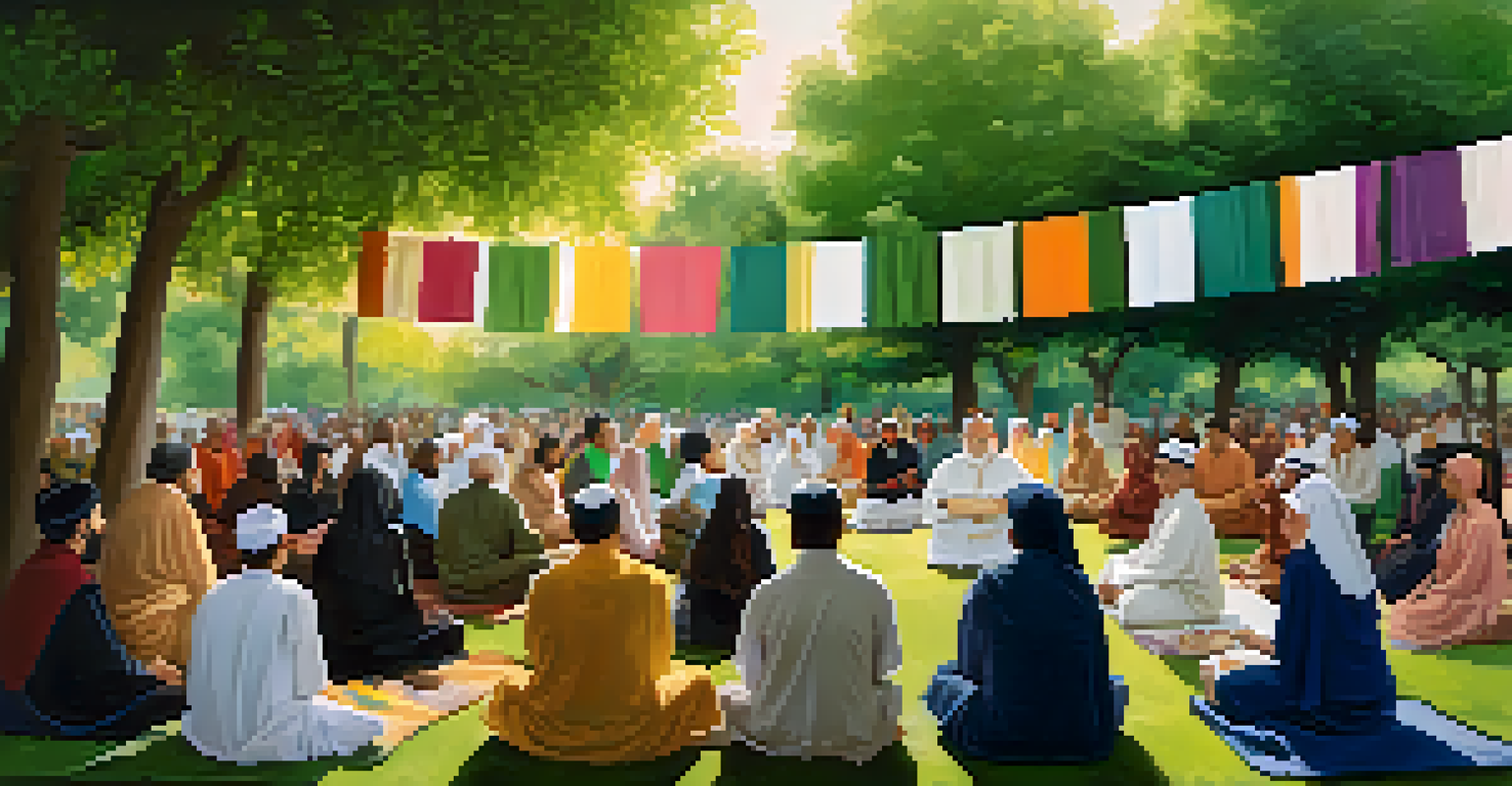Cultural Spirituality and Its Impact on Global Civic Duties

Defining Cultural Spirituality and Its Importance
Cultural spirituality refers to the ways in which cultural practices and beliefs intertwine with spiritual experiences. This concept is important because it helps individuals find meaning and purpose within their communities. By understanding cultural spirituality, we can appreciate how diverse beliefs shape our collective identity and values.
Spirituality is not a religion, it is a way of life.
For instance, many indigenous cultures emphasize a deep connection to nature, which influences their spiritual practices and community responsibilities. This relationship fosters a sense of stewardship, encouraging individuals to care for the environment as a sacred duty. Consequently, these beliefs can inspire civic engagement focused on sustainability and conservation.
Ultimately, cultural spirituality serves as a foundation for community cohesion. It unites people through shared beliefs and practices, promoting collective action and shared responsibility in civic duties. When individuals feel spiritually connected to their culture, they are more likely to engage positively in their communities.
The Intersection of Spirituality and Civic Duties
Civic duties encompass the responsibilities that individuals have toward their community, such as voting, volunteering, and participating in local governance. When cultural spirituality is integrated into these duties, it adds a deeper layer of meaning and commitment. People often engage in civic responsibilities not just as citizens but as stewards of their cultural and spiritual heritage.

For example, in many cultures, community service is viewed as a spiritual practice, where helping others is seen as fulfilling a higher purpose. This perspective encourages individuals to see civic engagement as an extension of their spiritual beliefs, creating a sense of moral obligation. Such a viewpoint can lead to increased participation in civic activities, enhancing community well-being.
Cultural Spirituality Enhances Community
Cultural spirituality fosters a sense of connection and responsibility within communities, driving civic engagement and collective action.
Moreover, the integration of spirituality into civic duties can foster inclusivity. When people from various cultural backgrounds come together with a shared spiritual purpose, they can collaborate on initiatives that benefit the entire community. This collaborative spirit enriches civic life and helps bridge divides between different cultural groups.
Cultural Spirituality’s Influence on Global Movements
Throughout history, cultural spirituality has played a vital role in global movements advocating for social justice, peace, and environmental sustainability. Leaders often draw on their spiritual beliefs to inspire collective action and mobilize communities. These movements demonstrate how cultural spirituality can transcend boundaries and unite individuals toward a common cause.
The greatest danger in times of turbulence is not the turbulence; it is to act with yesterday’s logic.
For instance, the Civil Rights Movement in the United States was heavily influenced by spiritual leaders who emphasized love, justice, and equality. Their messages resonated with many, motivating people to participate actively in civic duties to challenge injustice. This blend of spirituality and activism showcases the power of cultural spirituality in fostering civic responsibility on a global scale.
Additionally, global climate movements often highlight the spiritual connection to the Earth, urging individuals to take action to protect the planet. By framing environmental issues through a spiritual lens, activists can inspire a sense of responsibility that transcends political barriers, encouraging a more profound commitment to civic duties worldwide.
Challenges in Integrating Spirituality and Civic Engagement
Despite the benefits, integrating cultural spirituality into civic engagement is not without challenges. One major hurdle is the potential for misunderstanding or misinterpretation of spiritual beliefs among diverse groups. When individuals from different backgrounds come together, their unique spiritual perspectives may clash, leading to conflict rather than collaboration.
Moreover, some people may view spirituality and civic duties as separate domains, failing to recognize their interconnectedness. This disconnection can result in lower civic participation, as individuals may not see how their spiritual values align with their responsibilities to their community. Overcoming this challenge requires education and dialogue to foster understanding and promote inclusivity.
Spirituality Deepens Civic Duties
Integrating cultural spirituality into civic responsibilities transforms community service into a moral obligation, promoting active participation.
Finally, there is a risk of commodifying cultural spirituality, particularly in contexts like activism, where the focus may shift from genuine belief to performative participation. This can dilute the authenticity of spiritual practices, leading to disillusionment among community members. Addressing these challenges is essential to ensure that cultural spirituality remains a meaningful driver of civic engagement.
Case Studies of Successful Cultural Spirituality Initiatives
Numerous case studies illustrate how cultural spirituality can effectively enhance civic engagement. For instance, the 'Interfaith Youth Core' in the United States brings together young people from diverse religious backgrounds to collaborate on community service projects. This initiative not only fosters understanding among different faiths but also encourages participants to view their civic duties through a spiritual lens.
Another example is the 'Earth Guardians,' a global movement led by youth advocating for environmental protection. Their approach emphasizes a spiritual connection to nature, motivating young people to take action for the planet. By framing environmental advocacy as a spiritual responsibility, they inspire a new generation to engage in civic duties related to sustainability.
These case studies demonstrate the power of cultural spirituality in mobilizing communities toward collective action. They highlight the importance of creating spaces where individuals can connect their spiritual beliefs with civic responsibilities, ultimately leading to positive social change.
Future Directions for Cultural Spirituality and Civic Duties
Looking ahead, the integration of cultural spirituality into civic duties presents exciting opportunities for fostering community engagement. As society becomes increasingly diverse, there is a growing need for dialogue that respects and honors various spiritual beliefs. Initiatives that promote this dialogue can help create a more inclusive civic environment, encouraging participation from all community members.
Moreover, leveraging technology can enhance the connection between spirituality and civic engagement. Online platforms can facilitate discussions and collaborations among individuals with shared spiritual values, regardless of geographic barriers. This virtual connectivity offers a unique opportunity to mobilize communities and inspire collective action on a global scale.
Challenges in Spiritual Integration
Misunderstandings and commodification can hinder the effective integration of cultural spirituality into civic engagement, requiring dialogue and education.
In conclusion, the future of cultural spirituality and civic duties lies in embracing diversity and fostering understanding. By recognizing the profound impact of spirituality on civic engagement, we can work towards more cohesive and compassionate communities. This approach not only honors individual beliefs but also cultivates a shared sense of responsibility for the greater good.
Conclusion: The Lasting Impact of Cultural Spirituality
Cultural spirituality has a profound impact on our understanding of civic duties and responsibilities. As we explore the connections between spirituality and community engagement, it becomes clear that these elements are deeply intertwined. By recognizing the importance of cultural spirituality, we can enhance our collective commitment to civic duties and foster a more inclusive society.
The lessons learned from various cultural perspectives can guide us in addressing contemporary challenges, from social injustices to environmental crises. When we come together with a shared spiritual purpose, we can mobilize our communities toward meaningful action, creating positive change in our world.

Ultimately, embracing cultural spirituality in our civic lives not only enriches our individual experiences but also strengthens the fabric of our communities. As we move forward, let’s continue to honor and celebrate the diverse spiritual beliefs that inspire us to fulfill our civic responsibilities.